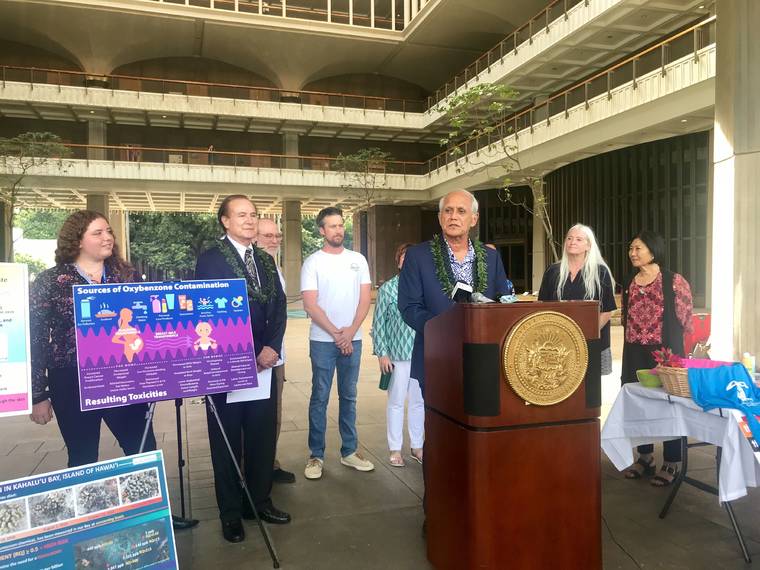Hawaii bills would ban more sunscreens in the isles

NINA WU / NWU@STARADVERTISER.COM
Sen. Mike Gabbard speaks today at the State Capitol about bills to restrict certain chemicals in sunscreens.
Hawaii legislators today announced the introduction of bills that restrict the sale of sunscreens with anything other than those deemed safe for the coral reef as well as human health in the state.
The companion bills – Senate Bill 2278 Opens in a new tab and House Bill 2248 Opens in a new tab— propose sweeping legislation that would only allow sunscreen products with ingredients that the U.S. Food and Drug Administration generally recognizes as safe and effective, to be sold or distributed in Hawaii, starting Jan. 1, 2023.
Those two ingredients — zinc oxide and titanium dioxide — are found in mineral-based sunscreens.
They build upon an earlier bill the state Legislature passed in Opens in a new tab2018 Opens in a new tab, banning the sale of over-the-counter sunscreens containing oxybenzone and octinoxate, deemed harmful to Hawaii’s coral reefs. Upon Gov. David Ige’s signature, Hawaii became the first state in the nation to pass such a law Opens in a new tab, which goes into effect on Jan. 1, 2021.
“We always knew there were other sunscreen chemicals threatening our coral reefs,” said Sen. Mike Gabbard, who introduced the 2018 bill. “In 2018, when we got Act 104 passed, we only had sound science on oxybenzone and octinoxate. Now we have the FDA directive. We know it’s time to move forward with the other 14 chemicals.”
Those other 14 chemicals the bills cover include ones commonly listed in many commercial sunscreens sold on store shelves, including homosalate, octisalate, octocrylene, and avobenzone.
Don't miss out on what's happening!
Stay in touch with breaking news, as it happens, conveniently in your email inbox. It's FREE!
Legislators said not only would these bills reduce the impact of sunscreen pollution to Hawaii’s coral reefs and marine animals, but address concerns about certain sunscreen ingredients on human health.
After the 2018 ban was passed, other jurisdictions followed suit, said legislators introducing the bills, including Aruba, the Marshall Islands, the U.S. Virgin Islands, Palau and the city of Key West, Fla.
Gabbard said new developments include the FDA’s proposed rule Opens in a new tab last year reviewing sunscreen ingredients, as well as updates to how products are labeled in light of new scientific evidence.
The FDA has determined that zinc oxide and titanium dioxide belong to Category I, or generally regarded as safe and effective.
But it has determined PABA and trolamine salicylate are Category 2, or not generally safe and effective for use in sunscreens Opens in a new tab. The FDA placed 12 other ingredients in Category 3 because it has insufficient data to make a determination, and is seeking additional information from the industry.
Gabbard said scientific studies now show some of these chemicals may have harmful impacts on human health, including uterine diseases in women, breast cancer, and Hirschsprung disease among infants.
“Since only zinc oxide and titanium dioxide are considered Category 1 by the FDA, then only these two sunscreen ingredients will be allowed in products sold in Hawaii,” said Rep. Gene Ward in a news release.
In the Senate, SB2278 was introduced by senators Mike Gabbard, Gil Riviere, Russell Ruderman, Sharon Moriwaki, and Clarence Nishihara.
In the House, HB2248 was introduced by representatives Gene Ward, Rida Cabanilla Arakawa, Chris Lee, Amy Perruso, David Tarnas, Chris Todd, Tom Brower, Lynn DeCoite, and Dee Morikawa.
A public hearing is scheduled before a Senate committee on Agriculture and Environment at 1:30 p.m. on Feb. 5 in conference room 224.
The law banning the sales or distribution of sunscreens with oxybenzone and octinoxate in 2018 was opposed by the Hawaii Medical Association, Retail Merchants of Hawaii, ABC Stores, Personal Care Products Council, as well as Bayer, which manufactures Coppertone sunscreens.



